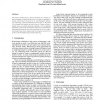69 search results - page 1 / 14 » Identifying refactoring opportunities by identifying depende... |
ACSC
2006
IEEE
13 years 10 months ago
2006
IEEE
The purpose of refactoring is to improve the quality of a software system by changing its internal design so that it is easier to understand or modify, or less prone to errors and...
CSMR
2009
IEEE
13 years 11 months ago
2009
IEEE
Extract Method has been recognized as one of the most important refactorings, since it decomposes large methods and can be used in combination with other refactorings for fixing a...
BMCBI
2008
13 years 4 months ago
2008
Background: The previous studies of genome-wide expression patterns show that a certain percentage of genes are cell cycle regulated. The expression data has been analyzed in a nu...
BMCBI
2007
13 years 4 months ago
2007
Background: The mechanisms underlying protein function and associated conformational change are dominated by a series of local entropy fluctuations affecting the global structure ...
MSR
2006
ACM
13 years 10 months ago
2006
ACM
Refactorings are program transformations which should preserve the program behavior. Consequently, we expect that during phases when there are mostly refactorings in the change hi...


